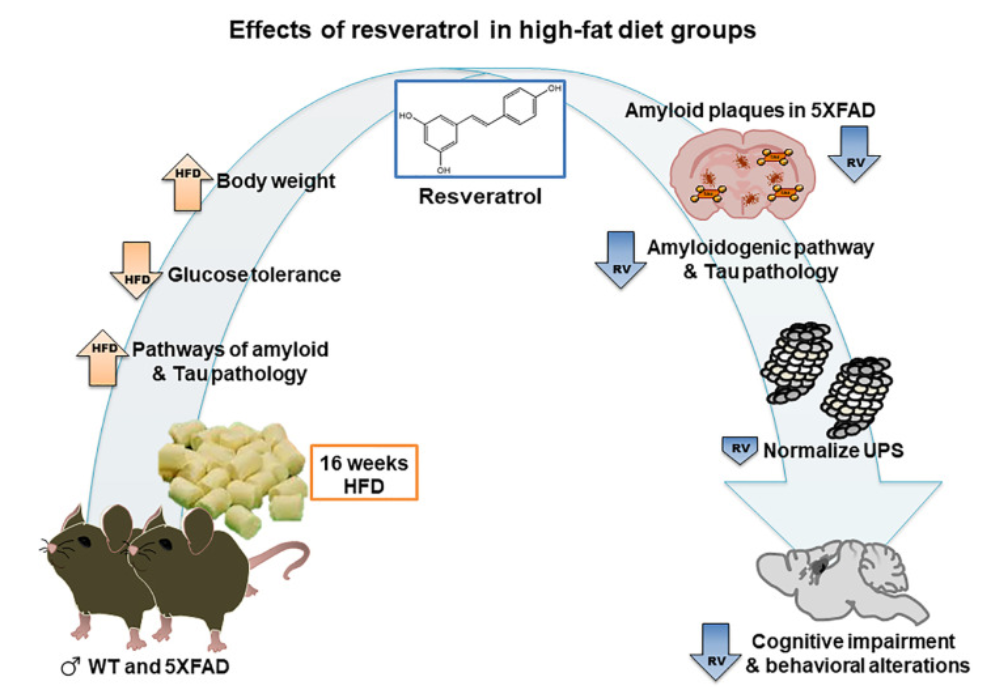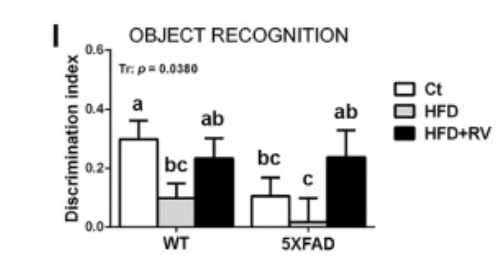Over the last few years, overconsumption of calories that derive from saturated fat has been a catalyst to the progression of global obesity, and metabolic and brain disorders have also been linked to caloric overconsumption. Mouse and human models have provided overwhelming evidence that Alzheimer’s disease, along with other manifestations of cognitive impairment, can be attributed to the consumption of a high-fat diet (HFD). However, the mechanism of action that leads to adverse effects in the human brain along with the development of Alzheimer’s has yet to be elucidated.
The effects of resveratrol, a neuroprotective polyphenol agent found in common dietary sources, on the stimulation and progression of Alzheimer’s disease pathology was studied by Sarroca and colleagues from the Institut d’Investigacions Biomèdiques de Barcelonssa in Spain. One study they did that was published in The Journal of Nutritional Biochemistry revealed resveratrol’s ability to protect against high-fat diet-induced memory loss in mice. In addition, data showed that memory loss could be prevented in mice that were genetically modified to model Alzheimer’s disease through incorporation of resveratrol. Amyloid plaques and neurofibrillary tangles, which stem from Alzheimer’s disease, were also shown to be diminished upon treatment with resveratrol.
The computed data on resveratrol promotes its suggested benefits as a nutraceutical agent against Alzheimer’s disease and neurodegeneration. “Our data suggest that resveratrol can correct the harmful effects of a high-fat diet on the brain and may be a potential therapeutic agent against obesity-related disorders and Alzheimer’s disease pathology,” said the authors in their article.

Diets as a determinant of dementia
As the risk of Alzheimer’s emerging with age increases upon caloric overconsumption from high-fat diets, diet is considered an essential determinant of healthy aging of the brain. Obesity, oxidative stress, inflammation, and Alzheimer’s disease like alterations in the brain have all been linked to diets high in lard concentration, according to experimental studies. While these effects have been linked to moderate cholesterol content, the main contributor to these effects is saturated fats. However, further studies are required to develop safe and effective therapeutics as well as understand how these processes work.
Mimicking calorie restriction with resveratrol
Resveratrol is a polyphenol that can be found in a variety of foods, including grapes and berries. The scope of potential therapeutics for resveratrol includes anti-inflammatory, neuroprotective, antioxidant, and longevity-promoting properties. Furthermore, the advantageous aging effects normally seen in patients with dietary caloric restriction, which is linked to lifespan extension and prevention of age-related diseases in experimental animals, can also be seen with supplementation of resveratrol. However, the manner in which resveratrol improves memory deficits and diminishes the detrimental effects in mice fed with high-fat diets is still not well understood.
The induction of metabolic stress through high-fat diets and its relation to the progression and development of Alzheimer’s disease was evaluated by Sarroca and colleagues by analyzing the involved molecular pathways. The following diets were fed to healthy and Alzheimer’s transgenic 5XFAD mice over a 16-week period: control diet, high-fat diet, or high-fat diet supplemented with 0.1% resveratrol. Another mouse model where mice were fed a typical, non-high fat diet previously demonstrated that treatment with 0.1% resveratrol induced cognitive enhancement in healthy mice in addition to halting the development of Alzheimer’s disease in 3xTG-AD mice.
A high-fat diet triggers Alzheimer’s disease hallmarks in mice
Neophobia, a condition of having extreme or irrational fear or dislike of anything new or familiar, along with anxiety are induced behavioral and psychological symptoms of dementia that were found to be linked to incorporation of high-fat diets in both healthy and Alzheimer’s transgenic 5XFAD mice. Sarroca and colleagues also showed that memory function in healthy mice was reduced upon incorporation of a high-fat diet.
A high-fat diet induces behavioral and psychological symptoms of dementia
The data collected while examining the incorporation of a high-fat diet into the 5XFAD mouse model demonstrated negative changes in amyloid pathology. Furthermore, the study showed that the cerebral cortex, amygdala, and hippocampus (areas critical for learning and memory retention) encompassed increases in amyloid burden. Tau pathology in both healthy and Alzheimer’s disease mice was also influenced by incorporation of a high-fat diet, and this led to increased pTau in the cerebral cortex.
Resveratrol recovers behavior and memory loss in mice fed a high-fat diet
Interestingly, the deleterious effects on mice brains that result from high-fat diets can actually be combatted with incorporation of resveratrol. In both strains, behavioral and psychological symptoms of dementia were reduced upon treatment with resveratrol. In addition to memory capacity being preserved in healthy mice, Alzheimer’s disease mice also showed total protection against memory loss.

Resveratrol protects against pathological mechanisms induced by a high-fat diet
Sarroca and Colleagues acknowledged the link between amyloid pathology in the 5XFAD model and incorporation of a high-fat diet, which showed negative effects in the amygdala, subiculum, and cerebral cortex. Elevated pTau shown in the cerebral cortex also indicated shifts in tau pathology in both WT and 5XFAD mice. Incidentally, conclusions on alleviating the detrimental effects of HFD through the analysis of changes in brain pathology demonstrate resveratrol’s remarkable therapeutic potential.

Resveratrol as a therapeutic option for neurodegeneration and Alzheimer’s disease
The findings show the possibility of raising the risk of Alzheimer’s disease or worsening its progression through dietary factors. However, resveratrol, a nutraceutical and neuroprotective agent, has been shown to hamper the negative effects of HFD through reduction of amyloid and tau pathologies. Furthermore, a reduction of anxiety and neophobia along with increases in memory skills result from the use of resveratrol. Sarroca and Colleagues further substantiate resveratrol’s suggested benefits to combat Alzheimer’s disease and neurodegeneration.